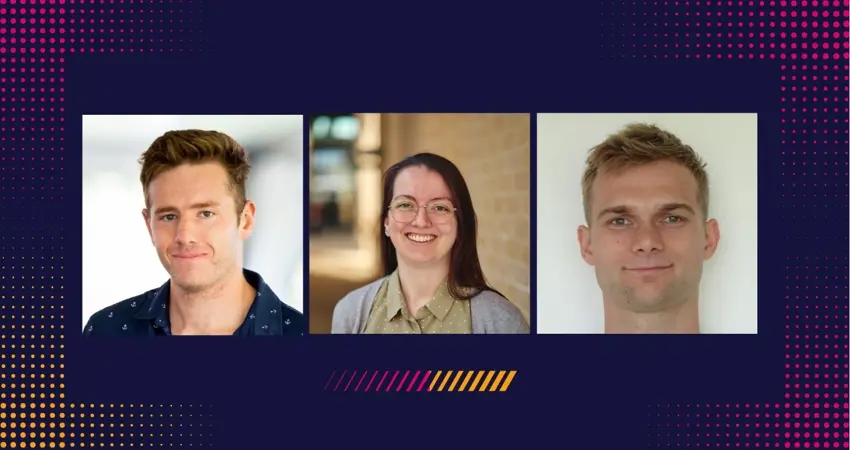02 May 2025
Four Engineers join Schmidt AI in Science Fellowship 2025 cohort
Postdoctoral Fellowship programme helps to accelerate the next scientific revolution by applying AI techniques to different fields

L to R: Thomas Monahan, Dr Alycia Leonard, Dr Daniel Schofield
Ten new Fellows have joined the Eric and Wendy Schmidt AI in Science Postdoctoral Fellowship programme at the University of Oxford. Now entering its third year, the programme is helping to accelerate the next scientific revolution by applying artificial intelligence (AI) techniques to research across the natural sciences, engineering, and mathematical sciences.
The 2025 cohort brings together outstanding early-career researchers from departments across the MPLS Division, who will use AI to advance fields ranging from cosmology to conservation, and from solar cell design to storm surge prediction. Through a combination of research, training, and collaboration, the Schmidt AI in Science Fellows will develop cutting-edge AI tools and apply them to pressing scientific challenges.
Four Oxford Engineers are amongst the new Fellows:
- Dr Alycia Leonard – Predicting Empowerment: AI-driven targeting of best-fit energy services for efficient sustainable development
- Taniya Kapoor – Engineering-informed foundation models for sustainable materials discovery
- Thomas Monahan - Global operational storm surge prediction using scientific machine learning and satellite altimetry
- Dr Daniel Schofield – Scaling AI for ethology and wildlife conservation
Dr Alycia Leonard, Senior Research Associate in Energy Systems at the Energy and Power Group, says, “As a Schmidt Fellow, I’ll be researching whether energy access interventions can be predictively targeted using scalable data to enable inclusive development. It’s all about matching the right energy technologies to the right people. To illustrate, there’s no use in providing a clean cookstove to a woman who wants a solar irrigation pump – it’s not what she needs or wants. But what if we could predict that she needed that pump and get it to her? With tightening development budgets, we need to be more efficient than ever in expanding energy access. I’m trying to find ways to use large-scale data to get the right energy technologies into the people’s hands so that they can improve their own lives on their own terms.”
DPhil Candidate Thomas Monahan, who is developing new methodologies for predicting and analyzing tides and tidally driven phenomena as part of the Environmental Fluids and Machine Learning research groups, says "My work looks to reinvent how storm surges are predicted globally — augmenting existing forecasting systems in countries such as the UK and the Netherlands and enabling early warning systems for storm surges in regions which lack the resources to produce conventional surge forecasts. The Schmidt fellowship will give me the opportunity and resources to produce these tools to help communities adapt to and mitigate the consequences of sea-level rise."
Dr. Daniel Schofield, Research Fellow in the Visual Geometry Group, says "With the biodiversity crisis accelerating, we urgently need tools to monitor and protect species in the wild. Scientists now collect vast quantities of rich audiovisual data, but major bottlenecks still prevent researchers from effectively leveraging AI to unlock these resources. Through this Fellowship, I aim to bridge AI and biology — scaling multimodal AI tools to support behavioural research and conservation. I also hope to use this platform to explore new directions in AI, inspired by natural intelligence and grounded in the complexity of real-world environments."
Dr Taniya Kapoor, Postdoctoral researcher at TU Delft, was an external candidate and will be joining the Department of Engineering Science later this year. Taniya’s research interests focus on the fusion of scientific machine learning and structural engineering.
The other 2025 Fellows at the University of Oxford and their research areas are:
- Augustin Marignier, Department of Earth Sciences – Illuminating the Earth’s inner core with Bayesian AI
- Deaglan Bartlett, Department of Physics – Trustworthy machine learning for cosmological discovery
- Hattie Stewart, Department of Physics – Galaxy modelling in next generation radio surveys with AI
- Jonathan Pattrick, Department of Biology – Characterising pollinator energetics and foraging dynamics using computer vision and AI
- Yuxing Zhou, Department of Chemistry – Understanding amorphous oxides for solar cell design using AI-driven modelling
- Siyi Yang, Department of Materials – Automated crystal growth parameter exploration using autonomous agents
Engineering Science Postdoctoral Fellow Dr Qi Hu joined the Fellowship programme last year, using neural network computations to enable new depths of research in biological sciences. Qi’s work in machine learning embedded adaptive optics (ML-AO) has attracted commercial interest. Read full case study.




